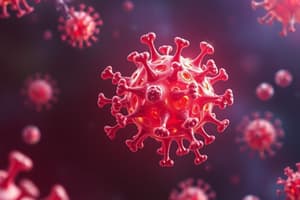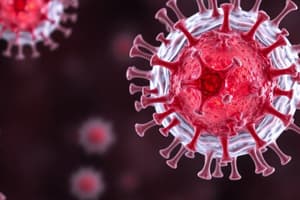Podcast
Questions and Answers
What was the significance of the term 'immunis' in the context of immunology?
What was the significance of the term 'immunis' in the context of immunology?
- It describes the immune system's response to pathogens.
- It means exemption from infectious diseases. (correct)
- It identifies the role of antibodies in serum.
- It refers to the method of vaccination developed by Jenner.
Which of the following individuals is associated with the first recorded vaccination against smallpox?
Which of the following individuals is associated with the first recorded vaccination against smallpox?
- Gorge Nuttal
- Louis Pasteur
- Emil von Behring
- Edward Jenner (correct)
Which immune response type is primarily responsible for antibody production?
Which immune response type is primarily responsible for antibody production?
- Cell-mediated immunity
- Phagocytosis
- Innate immunity
- Humoral immunity (correct)
What major discovery is Emil von Behring known for in immunology?
What major discovery is Emil von Behring known for in immunology?
Which statement correctly characterizes the immune system's role?
Which statement correctly characterizes the immune system's role?
Which of the following is NOT a primary lymphoid organ responsible for lymphocyte production?
Which of the following is NOT a primary lymphoid organ responsible for lymphocyte production?
Which statement about innate immunity is incorrect?
Which statement about innate immunity is incorrect?
What function do peripheral immune organs primarily serve?
What function do peripheral immune organs primarily serve?
Which of the following is NOT considered a barrier of innate immunity?
Which of the following is NOT considered a barrier of innate immunity?
How does the digestive tract contribute to innate immunity?
How does the digestive tract contribute to innate immunity?
What is the primary function of the complement system in the immune response?
What is the primary function of the complement system in the immune response?
Which of the following leukocytes is most abundant in the human body?
Which of the following leukocytes is most abundant in the human body?
What role do eosinophils primarily serve in the immune system?
What role do eosinophils primarily serve in the immune system?
What triggers the activation of the complement system?
What triggers the activation of the complement system?
Which leukocyte primarily functions in the detection and destruction of virally-infected cells?
Which leukocyte primarily functions in the detection and destruction of virally-infected cells?
Which leukocyte is least common in the human body?
Which leukocyte is least common in the human body?
What type of immune response do perforins contribute to?
What type of immune response do perforins contribute to?
What is the primary role of the blood clot when the skin is broken?
What is the primary role of the blood clot when the skin is broken?
What substance secreted in the ear canal provides protection from microorganisms?
What substance secreted in the ear canal provides protection from microorganisms?
How does the body utilize fever as a response to infection?
How does the body utilize fever as a response to infection?
Which enzyme found in tears and saliva is known to cause cell lysis in bacteria?
Which enzyme found in tears and saliva is known to cause cell lysis in bacteria?
What is the role of gastric acid (HCl) in the stomach?
What is the role of gastric acid (HCl) in the stomach?
What is one of the key mechanisms by which defensins protect against infections?
What is one of the key mechanisms by which defensins protect against infections?
What component of sweat contributes to its antimicrobial properties?
What component of sweat contributes to its antimicrobial properties?
What type of response do interferons provide when produced by the body's cells?
What type of response do interferons provide when produced by the body's cells?
Flashcards
Immunity
Immunity
The state of protection and defense from infectious diseases. This means being ‘exempt’ from getting sick due to protection from the immune system.
Immunology
Immunology
The branch of biomedical science that studies the body's defense mechanisms against pathogens.
Immune Response
Immune Response
The body's response to a foreign substance or pathogen, involving the immune system.
Immune System
Immune System
Signup and view all the flashcards
Phagocytosis
Phagocytosis
Signup and view all the flashcards
Anatomical and physical barriers
Anatomical and physical barriers
Signup and view all the flashcards
Phagocytic and cellular barriers
Phagocytic and cellular barriers
Signup and view all the flashcards
Physiologic and chemical mediated barriers
Physiologic and chemical mediated barriers
Signup and view all the flashcards
Inflammatory barriers
Inflammatory barriers
Signup and view all the flashcards
Innate immunity
Innate immunity
Signup and view all the flashcards
Mucus
Mucus
Signup and view all the flashcards
Fever
Fever
Signup and view all the flashcards
Leukocytes
Leukocytes
Signup and view all the flashcards
Interferons (IFNs)
Interferons (IFNs)
Signup and view all the flashcards
Lysozyme
Lysozyme
Signup and view all the flashcards
Sebum
Sebum
Signup and view all the flashcards
Defensins
Defensins
Signup and view all the flashcards
What is the complement system?
What is the complement system?
Signup and view all the flashcards
What is the classical pathway?
What is the classical pathway?
Signup and view all the flashcards
What is the alternative pathway?
What is the alternative pathway?
Signup and view all the flashcards
What are neutrophils?
What are neutrophils?
Signup and view all the flashcards
What are eosinophils?
What are eosinophils?
Signup and view all the flashcards
What are natural killer (NK) cells?
What are natural killer (NK) cells?
Signup and view all the flashcards
What are macrophages?
What are macrophages?
Signup and view all the flashcards
Study Notes
Pharmaceutical Microbiology II
- Course taught by Dr./Fahad Alzowahi, Assistant Professor in Microbiology, Pharmacy Department.
Brief History of Immunology
- The Latin term "immunis", meaning "exempt", is the origin of the English word "immunity".
- Immunity is the state of protection and defense from infectious diseases.
- Thucydides (430 BC) described a plague in Athens, noting that those who recovered were immune to subsequent infections.
- The Chinese and Turks developed early attempts at inducing immunity during the 15th century.
Smallpox Vaccination
- Reports suggest using dried smallpox pustules to induce future immunity.
- In 1798, Edward Jenner demonstrated smallpox vaccination.
Attenuated Vaccines
- Louis Pasteur (1884) developed attenuated vaccines reducing disease intensity.
Phagocytosis
- Elie Metchnikoff (1884) observed bacteria being engulfed and destroyed by cells, a process called phagocytosis.
Antibody Discovery
- George Nuttall (1888) identified the presence of antibodies within serum.
- Emil von Behring and Shibasaburo Kitasato (1890) demonstrated antibody activity against diphtheria and tetanus toxins, marking the start of the humoral theory of immunity.
Nobel Prizes in Immunology
- The table outlines Nobel Prize winners and their associated immunological concepts.
Immunology Definition
- Immunology is the branch of biomedical science studying the body's defense reactions (immunity).
- Immunity is the host's defense mechanism against foreign bodies (e.g., bacteria, viruses, fungi, parasites).
- The immune response is the body's reaction to foreign bodies or pathogens.
Immune System Components
- The immune system is a complex network of cells, tissues, and organs working together to defend the body against pathogens.
- Central (primary lymphoid) organs: Bone marrow and Thymus gland. They are responsible for the production and maturation of lymphocytes.
- Peripheral (secondary lymphoid) organs: Lymph nodes, Spleen, Tonsils, Vermiform appendix, Peyer's patches. These are sites for further lymphocyte maturation and trapping of antigens for exposure to T and B cells.
Types of Immunity
- Immunity can be innate (natural) or acquired (adaptive).
- Innate immunity is present from fetal development and is not specific to prior exposure. It acts non-specifically against all invaders.
- Innate immunity has four types of defense barriers:
- Anatomical and physical barriers—skin, tracheal cilia, digestive tract peristalsis, hairs in the nose.
- Physiological and chemical barriers—sweat, sebum, earwax, enzymes (lysozyme, phospholipase), gastric acid, defensins.
- Phagocytic (cellular) barriers—neutrophils, eosinophils, basophils, natural killer (NK) cells and macrophages.
- Inflammatory barriers—inflammation response.
- Acquired immunity develops in response to prior exposure; it is specific to the targeted pathogen.
Phagocytosis Process
- This is a process where cells engulf and destroy microbes.
- The steps include attachment, ingestion, fusion with lysosomes, digestion, and release of waste products.
Inflammatory Barriers
- Inflammation is an innate immune defense against injury, infection, or allergy.
- Inflammation's function is to protect the body from foreign invaders and repair tissue damage.
- Inflammation is characterized by cardinal signs: pain, swelling (tumor), redness (rubor), heat (calor), and loss of function.
- Inflammation involves vasodilation, increased capillary permeability, and leukocyte migration to the damaged tissue.
Factors Affecting Innate Immunity
- Age, race, environmental conditions, nutrition, and genetic factors influence innate immunity.
Immune System Advantages and Disadvantages
- Advantages of inflammation include destroying pathogens, preventing further injury, and promoting tissue repair.
- Disadvantages of inflammation include pain, organ rupture, tissue adhesion, and chronic diseases.
Studying That Suits You
Use AI to generate personalized quizzes and flashcards to suit your learning preferences.




